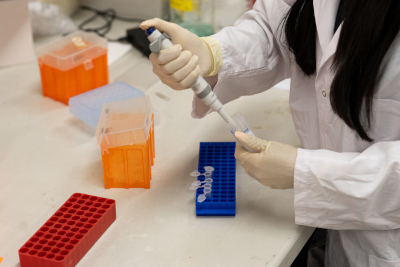
Professor Andrew Scott, head of a study looking for new brain cancer treatments
Brain cancer is among the most devastating of all cancers, hurting families and friends across Victoria. But new research is offering hope that survival rates can be improved.
A current research project, funded by supporters of Cancer Council Victoria and run by the Olivia Newton-John Cancer Research Institute and La Trobe University is aiming to achieve this improvement.
Led by Professor Andrew Scott, the study aims to achieve the best therapeutic outcomes possible for brain cancer patients by harnessing an exciting new drug.
“Our laboratory has developed a new antibody which we’ve shown in clinical trials to target brain tumours in patients,” Prof Scott said.
Prof Scott, working alongside Professor Hui Gan and Professor Weisan Chen, linked this new antibody to a toxin to produce the drug ABT-414. This has shown promising results in clinical trials in Australia and abroad.
A number of patients have responded remarkably well to the drug, with one patient free of cancer two years after treatment.
“Unexpectedly, we have identified patients who had clinical and radiological progression while being treated with the new drug who at subsequent surgery have been found to have no viable tumour,” Prof Scott said.
“Our research suggests this may in part be due to an induction of an immune response. This raises the exciting possibility of enhancing the therapeutic effect of ABT-414 or other antibody drug conjugates (ADCs) by combining them with drugs that enhance the immune response, and which have shown efficacy in other cancer types.
“We want to explore how best to combine this treatment with immunotherapy to inform the design of a new clinical trial. The ultimate outcome is to discover new therapeutic approaches to improve the survival of brain cancer patients.”
And Prof Scott says such new approaches, which people like you are making possible, are sorely needed.
“New therapies for brain cancer are urgently required due to the lack of treatment options and the poor outcomes for many patients,” he said.
Brain cancer is considered a low-survival cancer, with just 26 per cent of Victorians diagnosed with brain cancer living for five years or more – a figure which has barely budged in decades. In 2019, 481 cases of brain cancer were diagnosed in Victoria.
Disproportionately affecting children, brain cancer accounts for 43 per cent of deaths in Victorians aged less than 15 years old.
Despite these numbers, brain cancer only has very few treatment options and has long been in need of significant investment in research.

Thankfully, the momentum is turning.
Generous Cancer Council Victoria supporters, along with the Victorian State Government, are helping ensure diseases like brain cancer can catch up to the much higher survival rates of many other cancers.
Between them, $2.5 million was contributed last year to the Forgotten Cancers Program, aiming to ensure more people survive a diagnosis of a less common cancer.
Prof Scott is aiming to have his research project contribute to this crucial cause – and he is well suited to the task.
“Throughout my research career I have had an abiding interest in the mechanisms of tumour cell growth, and the development of innovative strategies to improve diagnosis and therapy for cancer patients,” he said.
Depending on the results of Prof Scott’s study, it’s possible that ADCs could be combined with immunotherapies in further clinical trials, which may lead to a step forward for brain cancer treatment.
With this project, and the renewed focus and funding for further research into brain cancer, there is good reason to hope that the survival rates for what is currently one of the most difficult cancers to treat may one day soon begin to match other cancers, which have made such huge advances in recent years.
This means more people surviving a brain cancer diagnosis into the future. That’s an amazing thing, and it wouldn’t be possible without your ongoing support. Thank you.